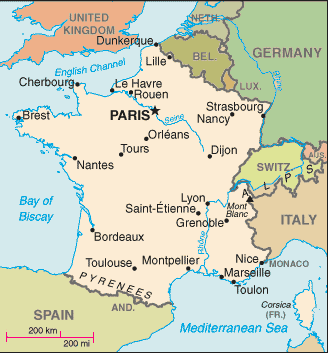
World Factbook as of October 2014: "The French economy is diversified across all sectors. The government has partially or fully privatized many large companies, including Air France, France Telecom, Renault, and Thales. However, the government maintains a strong presence in some sectors, particularly power, public transport, and defense industries. With at least 82 million foreign tourists per year, France is the most visited country in the world and maintains the third largest income in the world from tourism. France's leaders remain committed to a capitalism in which they maintain social equity by means of laws, tax policies, and social spending that mitigate economic inequality. France's real GDP stagnated in 2012 and 2013."
Economic growth rate
2013: 0.3%
2012: 0.0%
2011: 2.0%
2010: 1.7%
Unemployment rate
2013: 10.2%
2012: 9.8%
2011: 9.1%
2010: 9.3%
2014: Value Added Tax: 19.6%
(2012) France has superior health figures (life expectancy and infant mortality). The World Health Organization has described France as providing the world's best health care. The state health care system provides universal coverage and freedom to choose one's own doctor. It returns to its citizens up to 85% of their medical costs. Hospitals are described as well equipped and clean, with what is described as good food and red wine with dinners. Women giving birth without complications may stay as many as eight days
Health expenditures
2009: 3.5% of GDP, compared to 16.2% for the US
Income Distribution – GINI index
Ranks 117th among 141 countries (higher rank number – not to be confused with score number – is more equal, lower rank number is less equal). More equal than Britain, which ranks 104th, and the US, which ranks 41st.
Military expenditures as a percentage of GDP:
2005: 2.6%.
People
Living in an urban area
2008: 77%
Ethnic Diversity
France has citizens descended from North Africans – largely Muslim and largely Algerian. It has citizens descended from Indochinese and it has citizens who are Basque.
Religion
The French are less religious than US citizens. In a 2003 poll in France, 41% described themselves as atheist and 26% as having no religion. Eighty-three to eighty-eight percent describe themselves as Catholic -- some apparently seeing themselves as both attached to the Catholic Church and as atheists. The French try to keep religion private and in they oppose religious influences on government policy. Twelve percent of Catholics attend mass weekly according to the New York Times on April 19, 2005. The separation of state in religion prohibits government officials from promoting religion in anyway, including saying "God bless France" – in any language.
Geography
Western Europe. Slightly smaller than Colorado. Capital: Paris
Government
France is a Republic. It is a member of the European Union and has been a member of the North Atlantic Treaty Organization (NATO) since its inception in 1949.
Recent History
Since the end of WWII , the government has been increasingly integrating the nation's economy with that of Germany, forming what today is called the "Franco-German locomotive." France has few natural energy resources of its own, and in the 1970s it reduced its reliance on oil imports by conservation and solar and nuclear power. Nuclear power provided France with 30% of its electricity by 1973 and 75% by the end of the century, when its dependence of foreign energy sources was down to 45% – better than Japan, which was around 80% and the United States, which was more than 50%.
In the year 2000, France instituted the 35-hour work week, which adds to the cost of labor that goes into its products. For the year 1997 the average worker in France labored 1,645 hours, compared to 1,951 hours for the average American, which amounts to less than one hour per day and a little more than 38 eight-hour days per year.
Since 2002, France's currency has been the euro.
The marriage rate is declining. For each 1,000 persons, in 1980 there were 6.2 marriages, in 1990 5.1, in 2000 5.0, in 2004 4.3 compared to 7.8 for the United States.
In 2004 the French government maintained majority ownership in the railway, electricity, aircraft and telecommunications industries. Since the early 1990s France has been gradually "relaxing its control" over these industries, including selling its holdings in France Telecom and Air France.
November 3, 2010: Four points about recent labor strikes in France from a newsletter there that Dan Bessie, passes on to me.
Raising the retirement age is seen by some as a defeat at the hands of what’s called ‘liberalism’ in France as in economic liberalism or laissez-faire economics. There’s also a suspicion that raising the retirement age is an olive branch to capital markets, hoping that France can keep its high bond rating and therefore a low interest rate on its debt.
Sarkozy popularity continues to drop, resulting in voters expressing their anger, through strikes or support of strikes. Sarkozy’s decline in popularity, coupled with an election free year, meant strikes were the only outlet for people to express their anger.
Tradition and culture: striking is almost as French as wine and cheese. So much so that every year and a half to two years there are strikes in France, mostly in the public sector. Just the way things are here. Strikes and demonstrations are as much a part of the political discourse in France as talk radio is in America.
Unions in France play an important role in the French workplace even if only about 10% of the workforce is unionized. One important role is pushing back against the government (or management) threatening workers benefits.